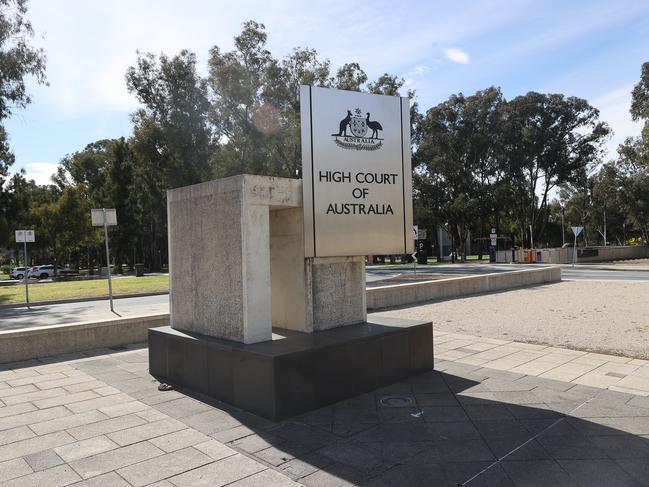Convicted terrorist Abdul Benbrika fights removal of Australian citizenship in High Court
A convicted terrorist is fighting the decision to strip him of his Australian citizenship in the High Court.
One of Australia’s most infamous domestic terrorists has gone to the nation’s highest court in his fight to have his citizenship restored as his potential deportation looms closer.
Abdul Nacer Benbrika’s challenge against the legality of the former Morrison government’s 2020 decision to revoke his citizenship under the Citizenship Act made its way to the High Court of Australia on Wednesday.
The full bench of the High Court will return with its decision later this year after being asked to determine whether the government erred in stripping Benbrika’s citizenship under section 36D of the Act.
Their ruling is expected to help define Australia’s new citizenship cessation laws, which have been in limbo after the High Court struck down Coalition-era laws last year.
Using the now defunct laws it introduced, the Coalition stripped citizenship under Section 36B of the Citizenship Act from Delil Alexander, a Turkish-Australian man accused of fighting for ISIS.
But the High Court found the Coalition’s laws were invalid because they involved the minister breaching the separation of powers by judging criminal guilt, which should be the responsibility of the courts alone.
The Albanese government has promised “tough new laws” to return to the courts the power to decide if a dual citizen should lose their Australian citizenship over terrorism conduct or a terrorism conviction.
While Benbrika’s case is different in that it involves section 36D of the Citizenship Act, his lawyers are relying on the Alexander case to argue there is a similar, unacceptable breach of the separation of powers at play.

Benbrika’s challenge centres on his claim Section 36D of the Act could not apply in his case because it gives the home affairs minister the power to punish criminal guilt.
His lawyers argue punishing criminal guilt is exclusively the responsibility of the courts and this responsibility was incorrectly given to the home affairs minister as it encroached on the separation of powers.
Under the separation of powers outlined in the Constitution, the executive – which includes government ministers – must not act in conflict with the judiciary or court system.
Born in Algeria, Benbrika moved to Australia in 1989 and became a citizen in 1998.
Benbrika – who was a known supporter of al-Qaeda founder Osama bin Laden – has been in custody for 18 years since his arrest in Melbourne in 2005.
He was jailed for a minimum of 12 years in 2009 after he was convicted of directing the activities of a terrorist organisation and other charges.
His barrister, Christopher Horan KC, told the High Court on Wednesday the punishment for Benbrika’s past criminal conduct had already been determined by the courts well before the decision to revoke his citizenship.
Mr Horan argued any additional punishment should be up to the courts alone to determine, including deciding if his citizenship should be revoked as a consequence for criminal conduct.

As the court pored over the Citizenship Act, commonwealth Solicitor-General Stephen Donaghue KC argued the decision to remove Benbrika’s citizenship under section 36D was valid.
Dr Donaghue, representing the home affairs minister, said this part of the legislation protected people because it meant they had to be found guilty beyond a reasonable doubt by a court before their citizenship could be taken off them.
“A model that protects the person by exposing them to a full judicial procedure doesn’t cross the (constitutional) line,” he said.
Additionally, Dr Donaghue said it wasn’t an unprecedented idea that people could be convicted of crimes and punished accordingly by a court and then receive additional punishment.
Then-home affairs minister Peter Dutton stripped Benbrika of his Australian citizenship in 2020 at the same time as he sought a continuing detention order against the convicted terrorist to keep him behind bars.
Due for release in November 2020, Benbrika instead became the first person to be held in Australia under the controversial orders, which had been introduced four years earlier.
With Benbrika’s continuing detention order due to expire later this year, the federal government plans to move him to immigration detention after he is released from prison and then deport him as soon as practical.
Home Affairs Minister Clare O’Neil in April cancelled the ex-citizen visa Benbrika was placed on in 2020 when his citizenship was revoked.

Wednesday’s hearing was not the first time a matter involving Benbrika has wound up in the High Court.
He has been involved in multiple actions in different courts challenging the continuing detention order that has kept him in prison beyond his original sentence.
The High Court in 2021 ruled the order was valid because it allows terrorists to be kept in detention if they pose a risk to the community or there is no other way to prevent an unacceptable level of risk.
Benbrika has a separate case running in the Victorian Supreme Court, due to return later this month, in which he is challenging the government’s decision to place him on the continuing detention order in 2020.
In that case, Benbrika’s lawyers claim the office of Mr Dutton – when he was home affairs minister – deliberately withheld a report that was highly critical of metrics used to assess a terrorist’s risk of offending.
The 2020 report, referred to as the Corner report, was critical of the VERA-2R tool used to measure this risk.
Benbrika’s lawyers have flagged that he intends to challenge the decision to strip his ex-citizen visa in the High Court should his High Court challenge against the removal of his citizenship fail.
Additional reporting: Liam Beatty



